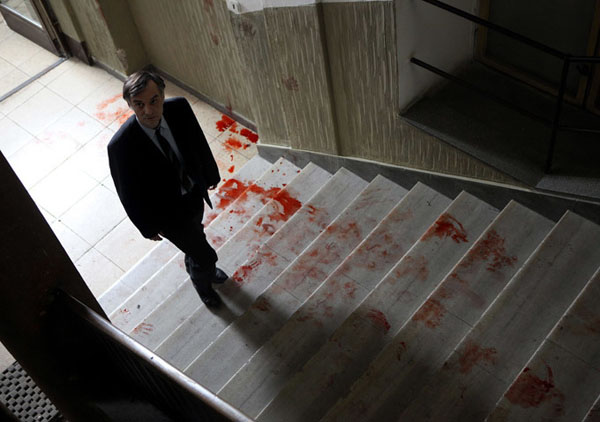Agnieszka Holland’s Burning Bush is “a sort of national epic focusing on the two martyrdoms of Jan Palach, the 20-year-old student who set himself aflame in Prague’s Wenceslas Square to protest the 1968 Soviet invasion of Czechoslovakia,” writes J. Hoberman at Artinfo. “The first martyrdom was Palach’s self-immolation; the second was Czech regime’s soul-crushing attempt to efface his memory. The opening is sensational and, as if the narrative weren’t compelling enough, Holland keeps trying to top it for the rest of the movie with a hectic, hyper dramatic camera style suggestive of her mentor, the great Polish director Andrzej Wadja. Her specific model seems to be Wajda’s masterpiece Man of Marble—ironic in that Holland was herself the model for the young filmmaker in the film and painful in that Burning Bush is filled with the sort of cheesy heart-clutchers that Wajda would never have stooped to and that Holland’s movie doesn’t need.”
“Burning Bush focuses on the impact that Palach’s sacrifice had on those around him, a handy entry point for Holland to portray the Czech student movement,” writes Ela Bittencourt in Slant. “Its key figures are painted with impressionistic brushstrokes, from leaders like Ondrej Trávnícek (Vojtech Kotek) to leaflet distributors and informers. There are the customary run-ins with the secret police, raids and chase scenes through the streets of Prague, general strike attempts, and eventual dissolution of the student union by the communists—incidents that may not be revelatory to those familiar with the Cold War history yet, as background, are vividly portrayed. With a running time of over four hours, the decentralized narrative benefits from the film’s original conception as a miniseries, with plenty of time to draw us into the morass that was the communist state.”
“You can see what… Holland is going for here,” writes Time Out New York‘s David Fear: “a multi-character dramatization that starts small and ends up putting an entire society under the microscope à la The Wire or Treme. (Given that the project had been commissioned for HBO Europe and Holland has helmed episodes for both TV shows, the similarity isn’t a coincidence.) Yet this three-episode miniseries never finds its footing as either a historical document or a layered look at the reverberations of martyrdom.”
Howard Feinstein, writing for Filmmaker, disagrees, declaring the mini-series “utterly astounding”:
Attractive Dagmar Buresova (Tatiana Pauhofova, convincing in a naturalistic performance) is the courageous, cool-headed lawyer who took on a libel case pursued by Palach’s brother and much-harassed mother against hardliner Vilem Novy (Martin Huba) for tainting the martyr’s reputation in Parliament. Given the repressive measures of the government and the dreaded secret police (STB), and the dysfunction of state institutions that continued to operate “as if” nothing had changed since the Russians took over, the verdict is a foregone conclusion.
Holland (Angry Harvest, Europa, Europa) is less interested in creating suspenseful court scenes than in detailing the steps in building the case, the instances of blackmail that insure it will not succeed, and the challenges to the regime made by a few daring souls in spite of almost certain retaliation. A coda informs us that Buresova became the new country’s first Minister of Justice in 1989. In spite of all they endured, both she and Palach were finally vindicated.
More from Oded Aronson (Toronto Film Review), Greg Cwik (Criticwire), and Jose Solis (Film Experience). Earlier: Reviews from Telluride and Toronto.
As Leo Barraclough reports for Variety, the Czech Film and Television Academy has decided to send Burning Bush into the foreign language Oscar race. And it screens for a third and last time this afternoon at the New York Film Festival.
Update, 10/14: From the Playlist‘s Rodrigo Perez comes news (to me) that Burning Bush has been disqualified from the Oscar race: “The 20th anniversary of Palach’s death inspired a new generation of students to start protests that led to the eventual fall of communism in Czechoslovakia in 1999, alongside the fall of the Iron Curtain in Europe. In a longtail victory and co-signing of justice, Burešová eventually became the first Minister of Justice in a open Czechoslovakia. For a film that celebrates such a milestone in Czechoslovakia’s history, one that all of its countrymen can be proud of, it is perhaps just one more unforgivable crime the movie won’t be selected for the Oscars based on yet another dumb technicality.”
Update, 10/18: “Ms. Holland’s film has been received as a kind of national purification,” writes Slawomir Sierakowski for the New York Times. “Various Czech directors began to offer a kind of public self-criticism, apologizing for the fact that they have been unable to make such a film. During this year’s Czech film awards, broadcast live on television, the renowned director Jan Hrebejk burst onstage, saying, ‘Listen, all that you’ve done this year amounts to nothing. The only good thing is Burning Bush.'”
NYFF 2013 Index. For news and tips throughout the day every day, follow @KeyframeDaily on Twitter and/or the RSS feed. Get Keyframe Daily in your inbox by signing in at fandor.com/daily.




